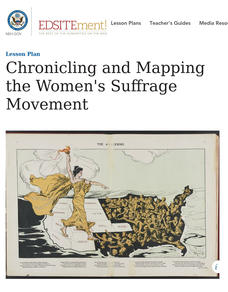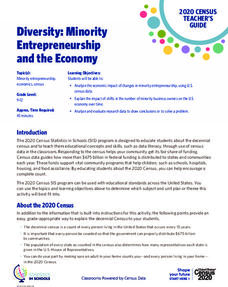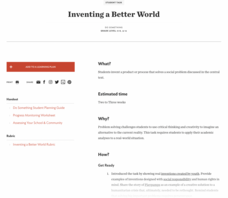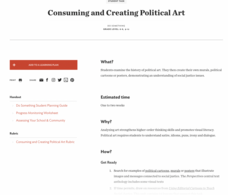National Endowment for the Humanities
Ratifying the Constitution
Ratifying the Constitution was no simple task. Using primary sources, such as classic writings from the Federalists and Anti-Federalists, young scholars examine the arguments for and against the Constitution. They then decide: Would they...
Teaching Tolerance
The True History of Voting Rights
Explore what voting rights really are in an intriguing lesson that explores the history of American voting. The resource examines the timeline of voting rights in the United States with group discussions, hands-on-activities, and...
National Endowment for the Humanities
Chronicling and Mapping the Women's Suffrage Movement
While women's suffrage is often believed to be the result of a single constitutional amendment, the effort of women to secure the vote spanned decades and continents. Using primary sources in online archives, class members explore the...
Teaching Tolerance
Why Local Elections Matter
Uncle Sam wants everyone to vote in local elections! Geared toward middle and high school scholars, the resource explores voter turnout and the importance of local elections. Academics participate in group discussion, complete...
C-SPAN
Survey Analysis- Public Perceptions of Voting and Elections
The perception of fairness in elections becomes more important with each passing election. Using data from a C-SPAN poll, budding historians consider the differences between how people perceive elections. The resource includes videos of...
PBS
Civic Engagement and How Students Can Get Involved
There is no age limit on civic engagement. Even if your pupils are not old enough to vote, they are old enough to get involved. Show them how with a PBS activity that underscores the importance of civic participation and models ways...
C-SPAN
Evaluating Historical Presidential Campaign Ads
Political ads flood the airwaves each election cycle. An activity including more than a dozen political ads from iconic presidential campaigns helps learners unpack how the sausage gets made during election "silly season." Using the...
Constitutional Rights Foundation
The Troubled Elections of 1796 and 1800
Congress does more than create new laws. Political scientists delve into the elections of 1796 and 1800 to understand how political parties, the Electoral College, and personal agendas affected the election process. The resource also...
US Department of Commerce
The Census Questionnaire: Then and Now
As the United States has changed, so has the census! While required by the Constitution, the questions the government asks to allot representation and federal funding has developed over time. Using images of previous censuses, young...
US Department of Commerce
The Opportunity Atlas
The American dream is to climb the social and economic ladder, but is it really possible? Using an online opportunity atlas, class members explore income and social mobility throughout the country. Discussion prompts allow learners to...
US Department of Commerce
Community Change
America is a country on the move. Analyzing data from the Census Bureau, class members gauge the people moving in and out of their areas. An interactive web feature allows pupils to see who is moving out and moving in, while discussion...
US Department of Commerce
Featured Activity: How the Census Impacts My Community
Individuals have $50,000 to spend on a program at their schools—what will they do with the money? After looking at the Constitutional mandate, learners use a census simulation activity to consider the question. After conducting their own...
US Department of Commerce
Diversity: Minority Entrepreneurship and the Economy
Using data from the Census Bureau, learners discover the growth in minority-owned businesses over time. After crunching numbers, analytical questions probe the reasons behind the shift.
American Battlefield Trust
Fredericksburg 360
Urban combat long preceded today's video games. Pupils today experience the battle of Fredericksburg—a major Civil War engagement in an American city—using a 360-degree interactive app. Users explore the battlefield online, using a...
American Battlefield Trust
Antietam 360
It was the single bloodiest day in Civil War history. Now, class members have the opportunity to walk in the footsteps of soldiers who fought in the Battle of Antietam using an interactive website. Supplemental resources include...
Teaching Tolerance
Inventing a Better World
From play pumps that provide clean water to shoes made from trash, innovators change the world one invention at a time. After researching various inventions, young entrepreneurs develop their own. Extension opportunities include prompts...
Teaching Tolerance
Consuming and Creating Political Art
A picture is worth a thousand words, but political art may be worth even more! After examining examples of political cartoons, murals, and other forms of public art, class members create their own pieces to reflect their ideals and...
American Battlefield Trust
The Battle of Saltville
It may be hard to see through the fog of war, but primary sources describing what happened at the Battle of Saltville during the Civil War shed some light on what happened there. Using primary sources, including descriptions from...
American Battlefield Trust
Civil War Battle Strategy
But for a fluke, 1862 could have gone differently during the Civil War. When Union troops found Robert E. Lee's battle plans for critical engagements in Maryland wrapped around cigars and tossed aside, history changed forever. Class...
American Battlefield Trust
Contrasting the North and South Before the War
Fundamental differences between the North and South led to the South adopting a system of enslaved labor. These abstract ideas become concrete when class members create a standing cube using information provided in the resource. Young...
National Woman's History Museum
The National Woman’s Party
Two parties led the women's suffrage movement. The National American Woman Suffrage Association (NAWSA) was a moderate organization while the National Women's Party (NWP) was more militant. Young historians investigate why members of the...
National Woman's History Museum
From the Declaration of Independence to the Declaration of Sentiments
As part of a study of women's rights in early America, class members compare the Declaration of Independence to the Declaration of Sentiments presented at the Seneca Falls Convention. As an exit ticket, individuals explain whether or not...
National Woman's History Museum
Inventive Women - Part 1
While a woman didn't invent the parasol, three women received patents for their improvements to the original design of umbrellas. In the first of a two-part series on inventive women, class members investigate the patent system to...
National Woman's History Museum
Women, Propaganda, and War
Governments rely on propaganda to build support for wars. Class members examine six propaganda posters, two each from the Spanish-American War, World War I, and World War II, and analyze how the way women were portrayed in the posters...























